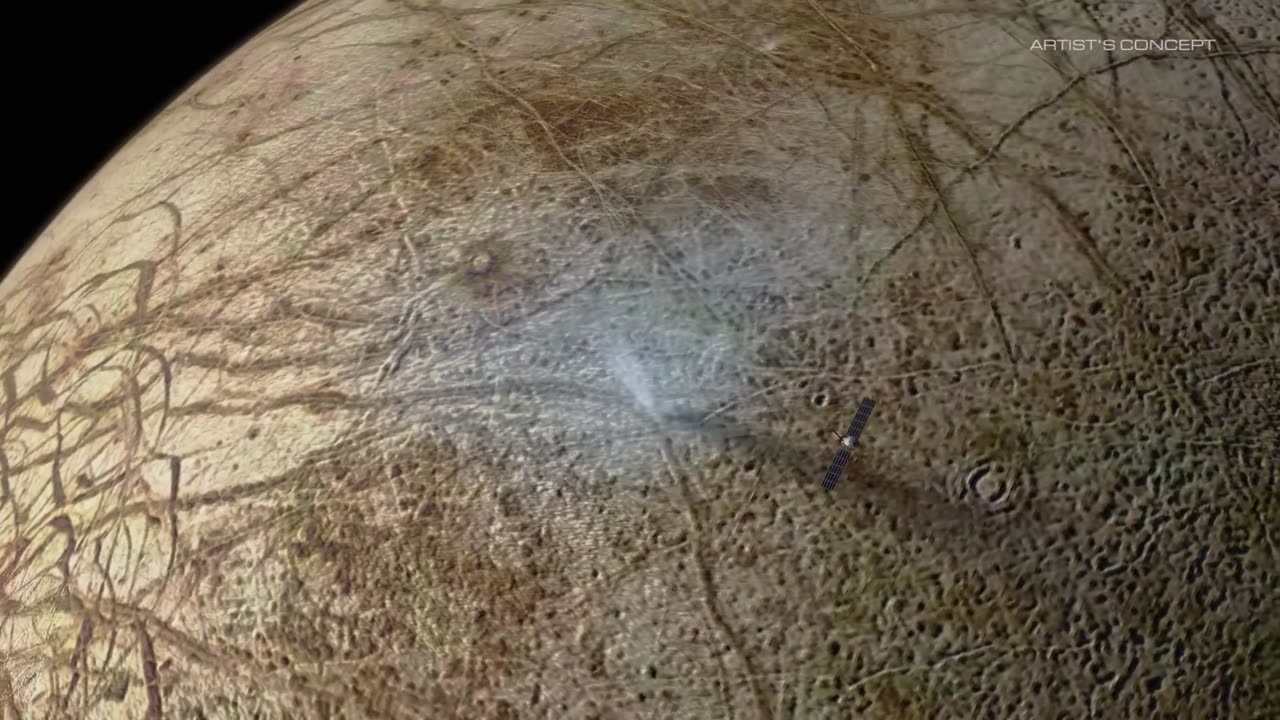Premium Only Content

Why Does NASA Want to Explore Jupiter’s Ocean Moon? (Europa Clipper Science Overview)
#europa #clipper #science #europaclipper #nasa #jupitersocean #nasaexploration #jupiterwater #nasamission #earthwater #europascience #nasascience #spacetechnology #spaceexploration #jupiter #overview #viral #trending #follow #foryou #views #rumblevideo #nasavideos
Why Does NASA Want to Explore Jupiter’s Ocean Moon? (Europa Clipper Science Overview)
Everywhere there’s water on Earth, there’s life. Does that hold true elsewhere in our solar system? NASA’s Europa Clipper mission will investigate Jupiter’s icy moon Europa, which — with its subsurface ocean — is one of the most promising places in our solar system to find environments capable of supporting life.
While Europa Clipper isn’t a life-detection mission, it will be the first to conduct a detailed survey of this icy moon to answer questions about Europa’s potential habitability and composition. The mission’s main goals are to determine the thickness of Europa’s icy shell; confirm the presence of an ocean; investigate the make-up of that ocean; and characterize the geology of the surface. The spacecraft will orbit Jupiter and make approximately 50 flybys of Europa. It’s equipped with a powerful suite of instruments that will work in sync to gather measurements and high-resolution images.
Europa Clipper is expected to launch in October 2024 from NASA’s Kennedy Space Center in Florida. It will arrive at the Jupiter system in 2030.
For more information on the mission go to: https://europa.nasa.gov/.
Credit: NASA/JPL-Caltech/APL
Why Does NASA Want to Explore Jupiter’s Ocean Moon? (Europa Clipper Science Overview)
Everywhere there’s water on Earth, there’s life. Does that hold true elsewhere in our solar system? NASA’s Europa Clipper mission will investigate Jupiter’s icy moon Europa, which — with its subsurface ocean — is one of the most promising places in our solar system to find environments capable of supporting life.
While Europa Clipper isn’t a life-detection mission, it will be the first to conduct a detailed survey of this icy moon to answer questions about Europa’s potential habitability and composition. The mission’s main goals are to determine the thickness of Europa’s icy shell; confirm the presence of an ocean; investigate the make-up of that ocean; and characterize the geology of the surface. The spacecraft will orbit Jupiter and make approximately 50 flybys of Europa. It’s equipped with a powerful suite of instruments that will work in sync to gather measurements and high-resolution images.
Europa Clipper is expected to launch in October 2024 from NASA’s Kennedy Space Center in Florida. It will arrive at the Jupiter system in 2030.
For more information on the mission go to: https://europa.nasa.gov/.
Credit: NASA/JPL-Caltech/APL
Why Does NASA Want to Explore Jupiter’s Ocean Moon? (Europa Clipper Science Overview)
Everywhere there’s water on Earth, there’s life. Does that hold true elsewhere in our solar system? NASA’s Europa Clipper mission will investigate Jupiter’s icy moon Europa, which — with its subsurface ocean — is one of the most promising places in our solar system to find environments capable of supporting life.
While Europa Clipper isn’t a life-detection mission, it will be the first to conduct a detailed survey of this icy moon to answer questions about Europa’s potential habitability and composition. The mission’s main goals are to determine the thickness of Europa’s icy shell; confirm the presence of an ocean; investigate the make-up of that ocean; and characterize the geology of the surface. The spacecraft will orbit Jupiter and make approximately 50 flybys of Europa. It’s equipped with a powerful suite of instruments that will work in sync to gather measurements and high-resolution images.
Europa Clipper is expected to launch in October 2024 from NASA’s Kennedy Space Center in Florida. It will arrive at the Jupiter system in 2030.
For more information on the mission go to: https://europa.nasa.gov/.
Credit: NASA/JPL-Caltech/APL
Why Does NASA Want to Explore Jupiter’s Ocean Moon? (Europa Clipper Science Overview)
Everywhere there’s water on Earth, there’s life. Does that hold true elsewhere in our solar system? NASA’s Europa Clipper mission will investigate Jupiter’s icy moon Europa, which — with its subsurface ocean — is one of the most promising places in our solar system to find environments capable of supporting life.
While Europa Clipper isn’t a life-detection mission, it will be the first to conduct a detailed survey of this icy moon to answer questions about Europa’s potential habitability and composition. The mission’s main goals are to determine the thickness of Europa’s icy shell; confirm the presence of an ocean; investigate the make-up of that ocean; and characterize the geology of the surface. The spacecraft will orbit Jupiter and make approximately 50 flybys of Europa. It’s equipped with a powerful suite of instruments that will work in sync to gather measurements and high-resolution images.
Europa Clipper is expected to launch in October 2024 from NASA’s Kennedy Space Center in Florida. It will arrive at the Jupiter system in 2030.
For more information on the mission go to: https://europa.nasa.gov/.
Credit: NASA/JPL-Caltech/APL
Why Does NASA Want to Explore Jupiter’s Ocean Moon? (Europa Clipper Science Overview)
Everywhere there’s water on Earth, there’s life. Does that hold true elsewhere in our solar system? NASA’s Europa Clipper mission will investigate Jupiter’s icy moon Europa, which — with its subsurface ocean — is one of the most promising places in our solar system to find environments capable of supporting life.
While Europa Clipper isn’t a life-detection mission, it will be the first to conduct a detailed survey of this icy moon to answer questions about Europa’s potential habitability and composition. The mission’s main goals are to determine the thickness of Europa’s icy shell; confirm the presence of an ocean; investigate the make-up of that ocean; and characterize the geology of the surface. The spacecraft will orbit Jupiter and make approximately 50 flybys of Europa. It’s equipped with a powerful suite of instruments that will work in sync to gather measurements and high-resolution images.
Europa Clipper is expected to launch in October 2024 from NASA’s Kennedy Space Center in Florida. It will arrive at the Jupiter system in 2030.
For more information on the mission go to: https://europa.nasa.gov/.
Credit: NASA/JPL-Caltech/APL
Why Does NASA Want to Explore Jupiter’s Ocean Moon? (Europa Clipper Science Overview)
Everywhere there’s water on Earth, there’s life. Does that hold true elsewhere in our solar system? NASA’s Europa Clipper mission will investigate Jupiter’s icy moon Europa, which — with its subsurface ocean — is one of the most promising places in our solar system to find environments capable of supporting life.
While Europa Clipper isn’t a life-detection mission, it will be the first to conduct a detailed survey of this icy moon to answer questions about Europa’s potential habitability and composition. The mission’s main goals are to determine the thickness of Europa’s icy shell; confirm the presence of an ocean; investigate the make-up of that ocean; and characterize the geology of the surface. The spacecraft will orbit Jupiter and make approximately 50 flybys of Europa. It’s equipped with a powerful suite of instruments that will work in sync to gather measurements and high-resolution images.
Europa Clipper is expected to launch in October 2024 from NASA’s Kennedy Space Center in Florida. It will arrive at the Jupiter system in 2030.
For more information on the mission go to: https://europa.nasa.gov/.
Credit: NASA/JPL-Caltech/APL
Why Does NASA Want to Explore Jupiter’s Ocean Moon? (Europa Clipper Science Overview)
Everywhere there’s water on Earth, there’s life. Does that hold true elsewhere in our solar system? NASA’s Europa Clipper mission will investigate Jupiter’s icy moon Europa, which — with its subsurface ocean — is one of the most promising places in our solar system to find environments capable of supporting life.
While Europa Clipper isn’t a life-detection mission, it will be the first to conduct a detailed survey of this icy moon to answer questions about Europa’s potential habitability and composition. The mission’s main goals are to determine the thickness of Europa’s icy shell; confirm the presence of an ocean; investigate the make-up of that ocean; and characterize the geology of the surface. The spacecraft will orbit Jupiter and make approximately 50 flybys of Europa. It’s equipped with a powerful suite of instruments that will work in sync to gather measurements and high-resolution images.
Europa Clipper is expected to launch in October 2024 from NASA’s Kennedy Space Center in Florida. It will arrive at the Jupiter system in 2030.
For more information on the mission go to: https://europa.nasa.gov/.
Credit: NASA/JPL-Caltech/APL
-
 6:10:21
6:10:21
JdaDelete
1 day ago $8.31 earnedDino Crisis - Sega Saturday
97.8K4 -
 23:22
23:22
MYLUNCHBREAK CHANNEL PAGE
1 day agoUnder The Necropolis - Pt 5
81.6K33 -
 2:26:11
2:26:11
Jewels Jones Live ®
2 days agoWINNING BIGLY | A Political Rendezvous - Ep. 108
146K44 -
 2:04:49
2:04:49
Bare Knuckle Fighting Championship
4 days agoBKFC FIGHT NIGHT MOHEGAN SUN FREE FIGHTS
74.3K7 -
 25:09
25:09
BlackDiamondGunsandGear
12 hours agoYou NEED to be Training For Whats to Come
51.2K11 -
 20:03
20:03
Sideserf Cake Studio
18 hours ago $1.76 earnedA HUNGRY HUNGRY HIPPOS CAKE THAT ACTUALLY WORKS?
48.1K14 -
 23:51
23:51
marcushouse
19 hours ago $1.60 earnedStarship’s Next Move Is Coming Sooner Than You Think!
33.7K6 -
 22:24
22:24
The Finance Hub
1 day ago $10.99 earnedBREAKING: JOE ROGAN JUST DROPPED A MASSIVE BOMBSHELL!!!
36.6K36 -
 55:02
55:02
PMG
15 hours ago $0.94 earnedHannah Faulkner and Miriam Shaw | Moms on A Mission
26.3K1 -
 1:21:05
1:21:05
I_Came_With_Fire_Podcast
1 day ago"Veteran Health, Military Culture, and American Exceptionalism" with Matt Kenney
93.8K21